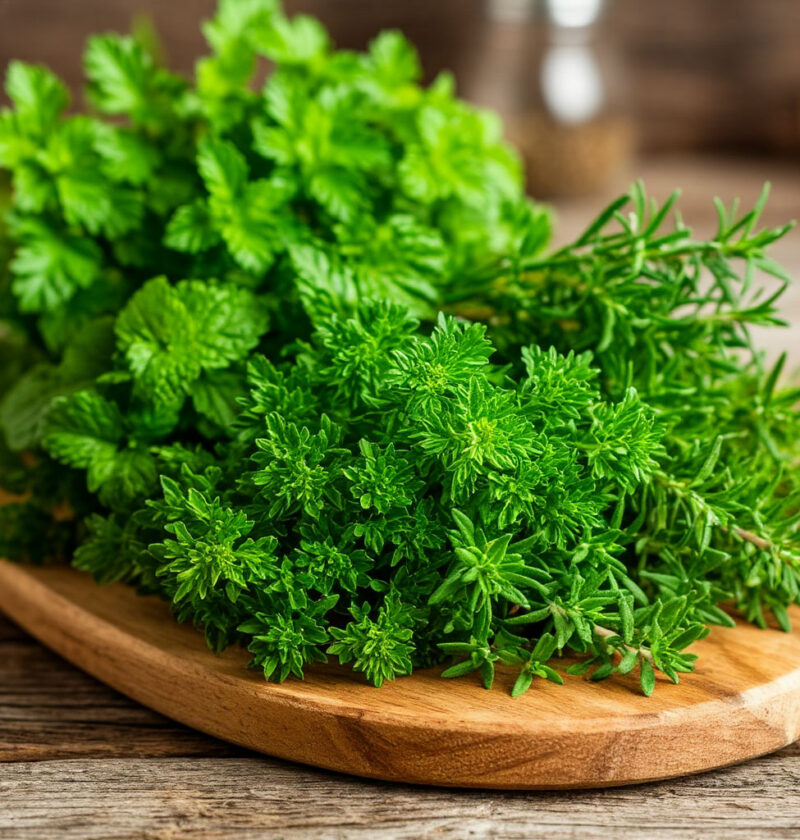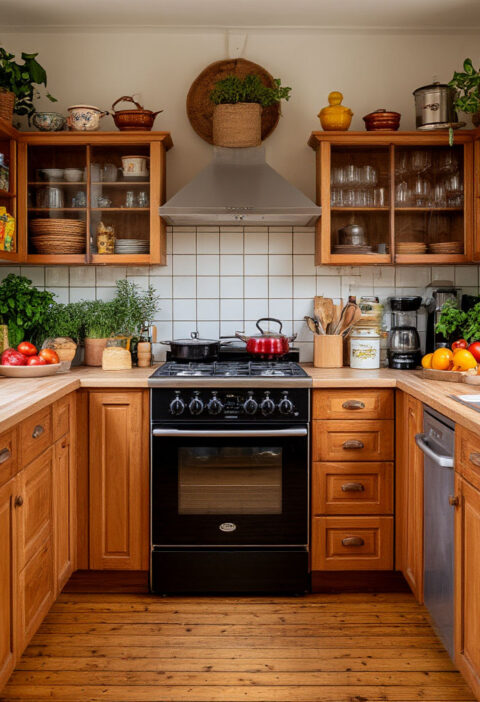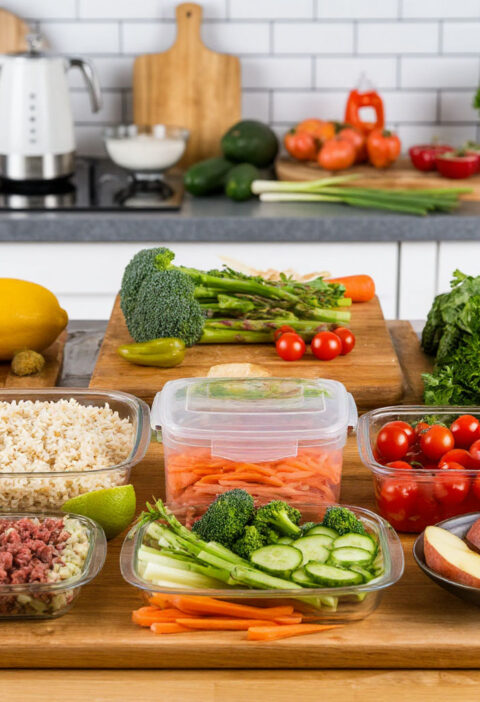Do you love cooking delicious meals at home and want to enjoy the aroma of fresh herbs every time you open your fridge? Then this post is just for you! Today we will talk about How to Keep Herbs Fresh Longer — simple ways to store greens that will turn your kitchen into a true zone of fresh flavors and scents. If you’re interested in learning more about kitchen storage tips, keep reading!
Why Is It Important to Store Greens Properly?
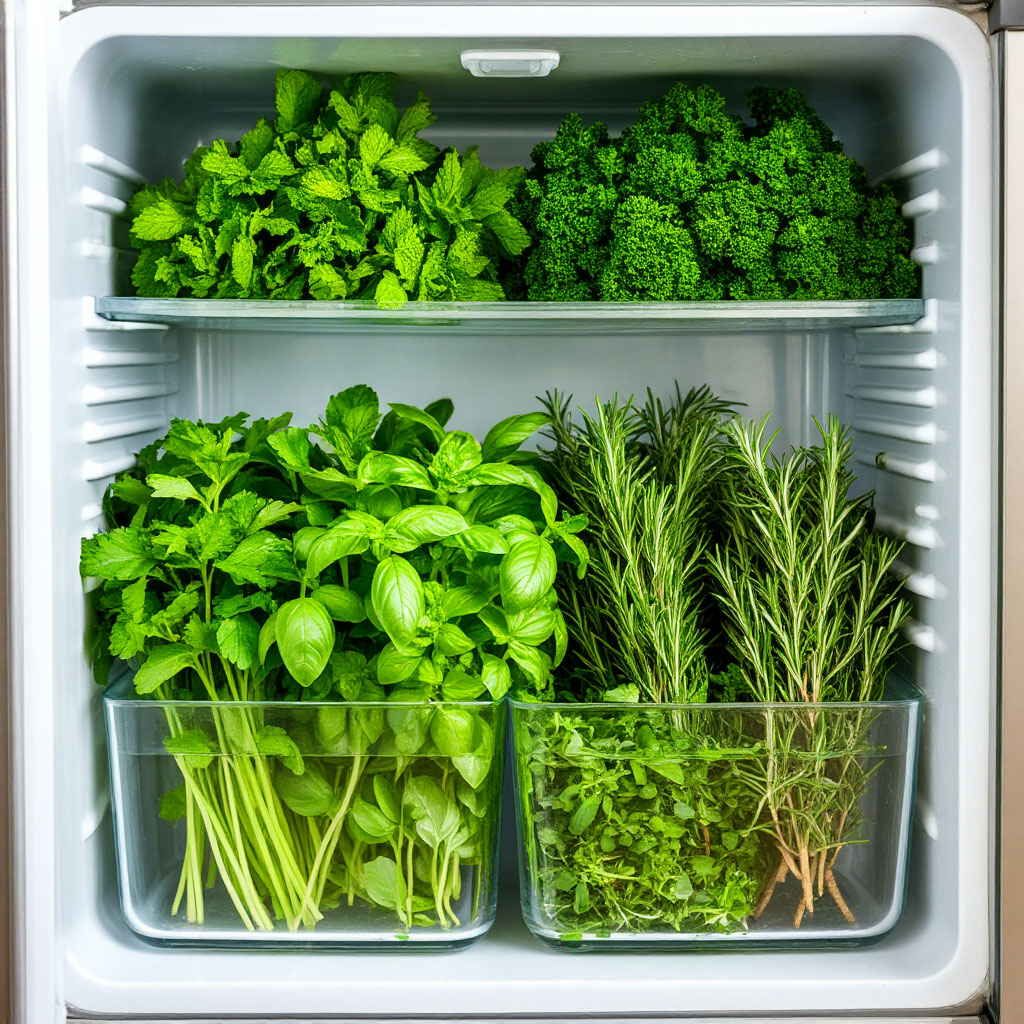
The freshness of herbs affects not only the taste of food but also the mood of the cook.Proper herb storage (parsley, dill, cilantro, lettuce, etc.) is important for several reasons:
- Preserving Freshness and Flavor. Improperly stored greens quickly wilt and lose their flavor. In the refrigerator with optimal humidity, they remain juicy and tasty longer.
- Preventing Rotting and Decay. Due to high moisture or drying out, greens can rot or wilt. Correct storage prevents mold and slime from forming.
- Retaining Nutrients. Vitamins (especially vitamin C and folic acid) and antioxidants break down when exposed to air and light. Airtight packaging or storing them in water slows oxidation.
- Saving Money. Spoiled greens have to be thrown away, while proper storage extends their shelf life.
Health Safety. Spoiled herbs may breed bacteria such as salmonella or E.coli. Freshly stored greens are safer to consume.
Who would refuse an appetizing bunch of basil or parsley right before dinner preparation? But sometimes it’s hard to maintain product quality over long periods. That’s where our tips on how to preserve herbs come in handy.
Basic Rules for Storing Fresh Greens
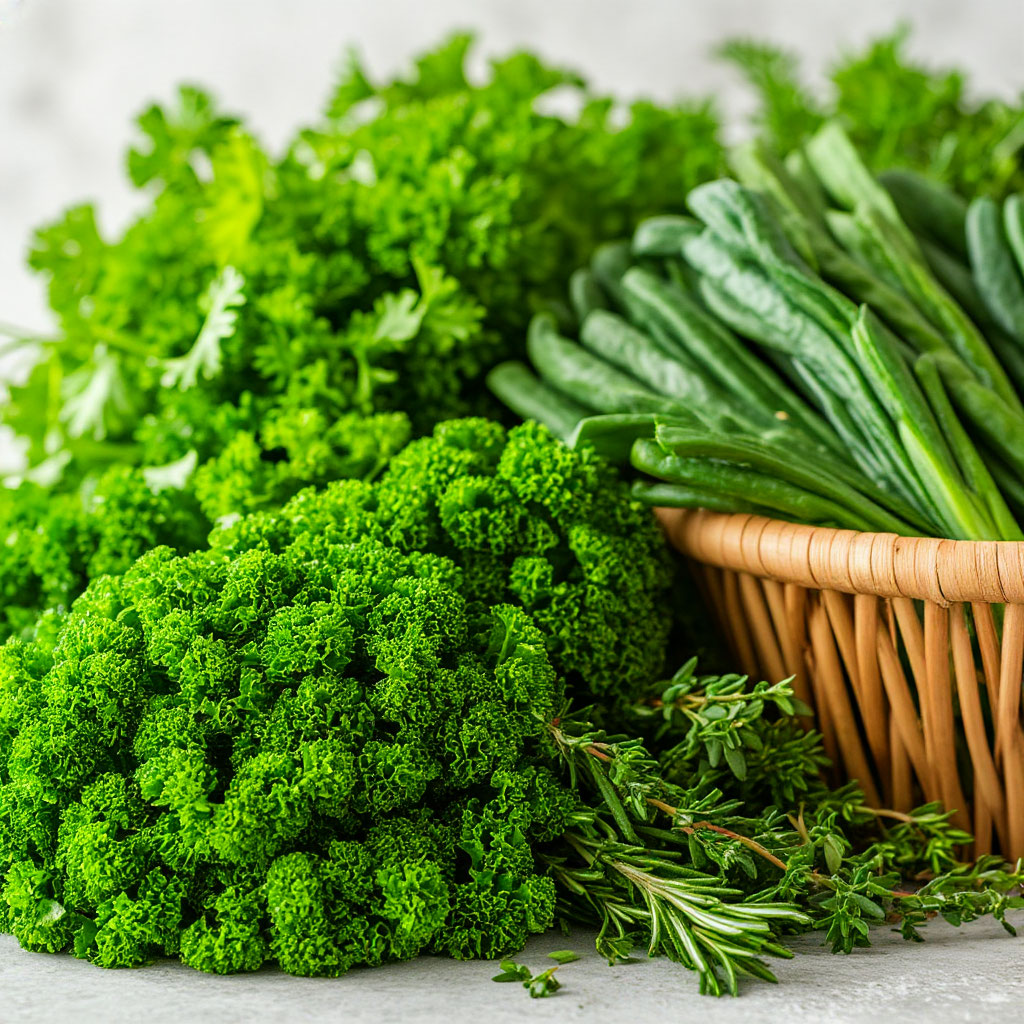
Before putting a bundle of dill or mint in the fridge, make sure it’s properly prepared. First, gently wash the leaves under cold running water, removing dirt and dust. Next, shake off excess moisture carefully and pat dry using paper towels to remove any remaining water. Clean, dry leaves last much better than wet ones.
Proper Packaging
A regular plastic bag is enemy number one for your favorite greens. Instead, try wrapping the bundle in a damp cloth or towel and placing it inside a sealed container. This way, the greens stay moist enough without rotting too fast. This simple hack allows your beloved basil to remain fresh far beyond its usual expiration date.
Maintain ideal humidity within the container since dryness causes rapid wilting of leaves. It’s essential to remember that a tightly closed box provides better preservation by protecting against exposure to air and light.
Where Should You Store Your Herbs in the Fridge?
Choosing the correct spot in the refrigerator plays a crucial role in maintaining the freshness of your herbs. The best place is near vegetables, in a special compartment designed for fruits and veggies. This helps avoid freezing and keeps products fresh for extended periods. Thus, you’ll still enjoy the taste of fresh spices even after a week has passed since purchase.
Tips for Keeping Herbs Fresh Longer
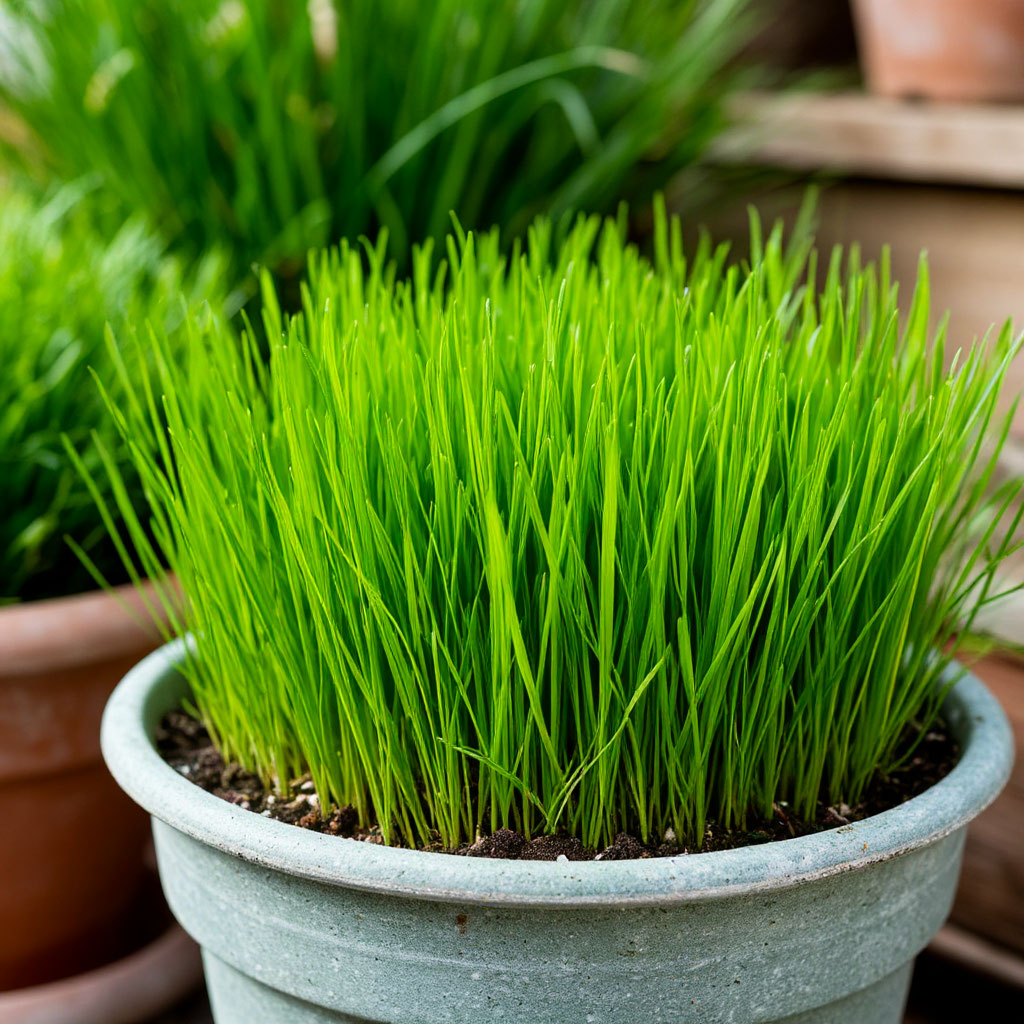
There are several tried-and-tested methods that significantly increase the shelf life of your favorite herbs
Humidity-Controlled Container
Place clean, dry herbs in a specialized container equipped with humidity control features (“freshness zone”). Alternatively, put the bunch in a small plastic bag sprinkled with a few drops of water and tie loosely, allowing some air circulation.
Water Glass
Put stems of green herbs in a glass filled with cool water like a bouquet of flowers. Cover the top with cling film or a plastic bag to create a mini-greenhouse effect. These measures allow your herbs to stay fresh for at least two to three weeks.
Vacuum Sealing
Use vacuum-sealed bags or containers. Herbs packed hermetically will serve you much longer compared to traditional storage methods.
Freezing
Chopped herbs placed in ice cube trays along with a little bit of vegetable oil or broth freeze well. Once frozen, these cubes become excellent additions to soups, stews, and sauces.
Optimal Conditions for Preserving Herbs
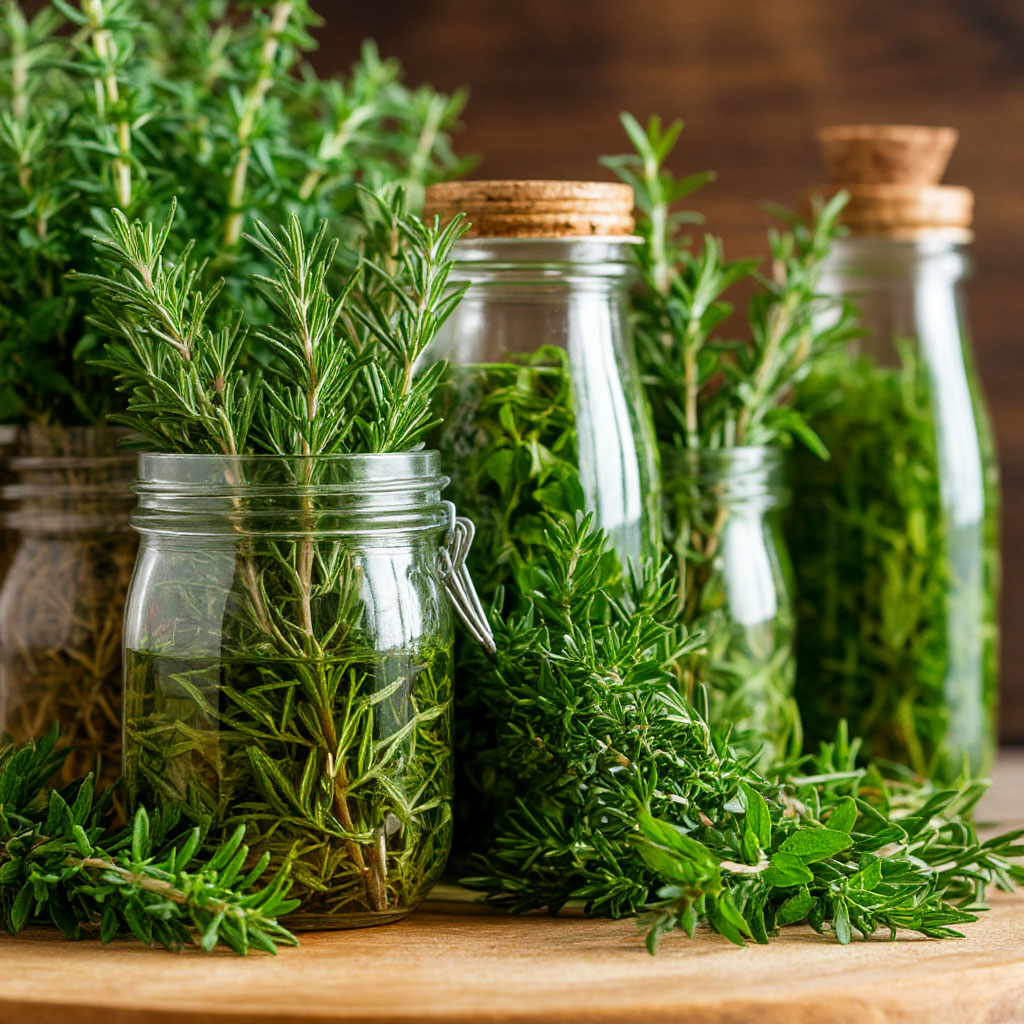
Temperature
Let’s find out how to keep greens fresh. Each type of herb requires specific temperature conditions. Most varieties retain their qualities best between +2°C and +5°C. Such temperatures slow down biochemical processes occurring in plant cells, preventing quick wilting and loss of color.
Higher temperatures cause excessive moisture loss and wilting. Low temperatures are equally dangerous—they can lead to cell chilling, brown spots appearing, and leaf structure damage.
Humidity
An ideal level of humidity to keep greens fresh falls within the range of 80–90%. Dry air leads to dehydration and wilting, whereas excessive moisture creates favorable conditions for fungal diseases and molds.
This explains why freshly picked or washed herbs should never be placed directly into plastic bags or other enclosed containers without prior treatment. Either pre-dry the herbs slightly or mimic a greenhouse environment by using damp fabric or film, ensuring adequate ventilation.
Light Exposure
Direct sunlight negatively impacts both the freshness and color of herbs. Light activates certain photosynthesis reactions resulting in chlorophyll breakdown and fading of vibrant colors. Leaves start turning yellowish and dull, losing their characteristic green hue.
Therefore, the optimum location to keep herbs fresh must be shielded from direct sunlight penetration. For instance, many recommend storing herbs in lower compartments of refrigerators equipped with dedicated sections (“freshness zones”) that maintain an optimal microclimate.
Oxygen Accessibility
Although oxygen is necessary for living organisms, prolonged storage often benefits from limited access to free-flowing air. Minimizing airflow reduces oxidative reactions leading to deterioration.
Thus, it is advisable to use hermetic packaging materials (ziplock bags, lids-on containers), though leaving a tiny gap for minimal air exchange remains recommended.
Storage Time
The shelf-life of all types of fresh greens is inherently limited. Standard storage durations vary depending on the herb variety:
Parsley, Dill, Celery: 1–2 weeks.
Basil, Thyme, Rosemary: 1 week.
Mint, Lemon Balm: 2–3 days.
However, even strict adherence to rules does not guarantee eternal freshness, so monitoring the condition of your harvest and promptly discarding spoiling elements becomes critical.
Kitchen Storage Tips: Where NOT to Store Fresh Herbs
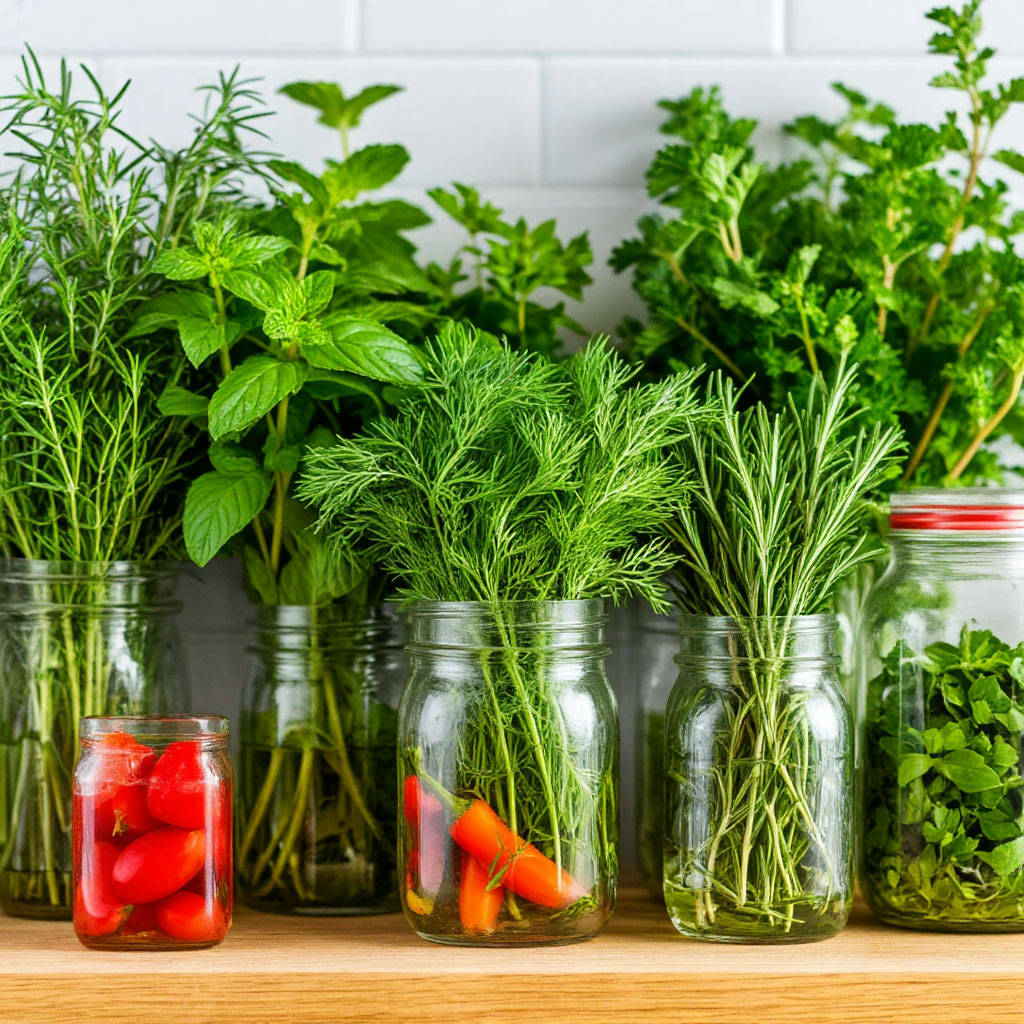
Certain locations are strictly prohibited for keeping fresh greens:
Open Air (Room Temperature)
Why Not:
– Moisture evaporates rapidly causing wilting.
– Bacteria and mold growth accelerate.
– Direct sunlight destroys chlorophyll and vitamins (especially Vitamin C and folate).
What Happens:
– Within 12–24 hours, leaves begin drooping and yellowing.
Tightly Sealed Bag Without Ventilation
Why Not:
– Accumulation of moisture leads to fermentation and decay.
– Anaerobic bacteria multiply faster (potentially harmful).
What Happens:
– Sliminess and unpleasant odor appear.
Extremely Wet Areas
Why Not:
– Excessive moisture triggers mold formation (particularly in delicate herbs like spinach and salad).
– Roots and stems begin rotting.
What Happens:
– White or black coating forms, becoming slippery.
Near Fruit (Apples, Bananas, Pears)
Why Not:
– Ethylene gas emitted by fruit accelerates ripening and spoilage.
What Happens:
– Herbs yellow and go bad twice as fast.
Warm Refrigerator (+7°C or Higher)
Why Not:
– At +8°C and above, bacterial multiplication increases.
– Herbs lose moisture and wilt.
What Happens:
– Even in the fridge, herbs will spoil within 2–3 days.
Metal Containers
Why Not:
– Metals corrode due to moisture, imparting an undesirable metallic taste.
What Happens:
– Herbs acquire a metallic smell.
Freezer Without Protection
Why Not:
– Unprotected herbs freeze, damaging texture and flavor.
What Happens:
– After thawing, herbs turn mushy.
In conclusion, if unsure about how to keep herbs fresh longer, follow basic guidelines:
Prepare herbs for storage: thoroughly rinse and dry.
Choose appropriate storage method: containers, water glasses, or vacuum sealing.
Create optimal conditions: approximately +2…+5°C temperature and ~80% humidity.
Avoid unfavorable places: heat sources, light, and dry air.
Adherence to these recommendations ensures maximum freshness and culinary enjoyment. Let your table always shine bright with vivid hues and intense aromas of natural herbs!
